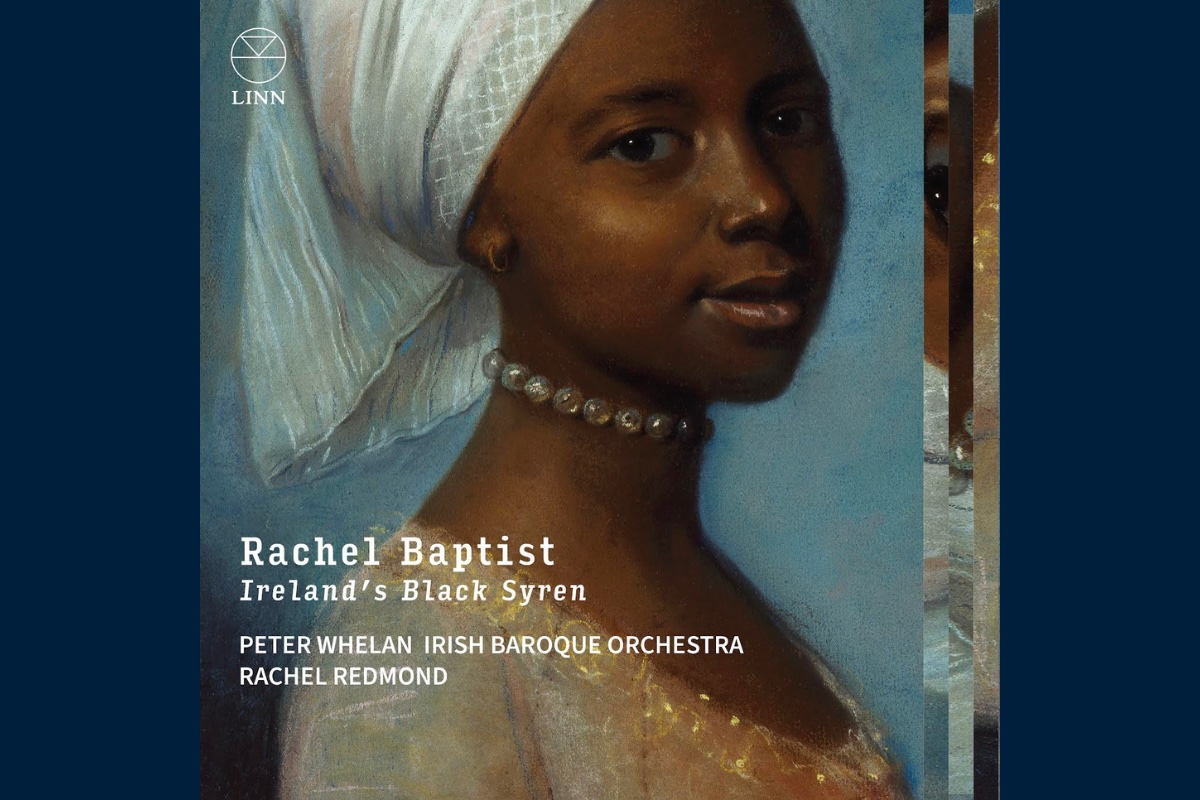There’s something quite delightful and, I think, unique about the recent series of albums released on Linn Records by the Irish Baroque Orchestra under Peter Whelan, collectively known as the Irish Heritage Cycle. Individually, each one focuses not necessarily on a composer or a musical format, but on a situation or character relevant to the musical scene in seventeenth- and eighteenth-century Ireland – whether it’s the castrato singer Giusto Fernando Tenducci, who fled the country after marrying his 15-year-old student, or the Chief Composer of Ireland from 1716, Johann Sigismund Kusser, or, more abstractly in The Hibernian Muse, the musical backdrop for the ruling classes in the Dublin of the day. Together, they present a thriving and cosmopolitan image of musical Dublin in the Baroque period (though, it’s worth noting, the musical life of a ruling class that was simultanously eroding the country’s own Gaelic art forms).
The latest release in this cycle is Rachel Baptist: Ireland’s Black Syren, with the part of Baptist being played by her Scottish namesake Rachel Redmond. What little is known or supposed about Baptist is summarised in the sleeve notes for the album: she was a well-received singer in the mid-eighteenth century, likely descended from Haitian slaves, with a repertoire encompassing Irish and Scottish airs, popular songs, and arias from cantatas and oratorios. So it seems likely that she was not a singer of particular fame (even the cover art of the album depicts not Baptist, but an unnamed young woman); rather the organisation seem to be attempting to highlight the often understated racial diversity of the time. There are flaws in its approach: a contemporaneous critique notes that audiences received Baptist ‘without remarks’ on the colour of her skin, which the sleeve notes cite as evidence of Dublin audiences’ racial tolerance, but surely the fact that this is worthy of note at all suggests the opposite. Despite these flaws, the attempt is admirable.
The first half of the album is given to Handel, with Redmond performing ‘Mirth, admit me of thy crew’ and ‘Softly sweet in Lydian measures’, from L’Allegro, il Penseroso ed il Moderato and Alexander’s Feast respectively, both serving to demonstrate Redmond’s lush tone colour.
These are followed by Handel’s four-movement secular cantata Diana cacciatrice, written for two sopranos, trumpet, strings and continuo. Much is made of crystalline echo effects here, in the manner of Bach’s later Flößt, mein Heiland, flößt dein Namen, with the trumpet echoing Redmond in the third movement and Aisling Kenny taking the echo soprano role in the fourth.
In the second half, space is given to Niccolò Pasquali, an Italian composer who lived in Dublin in two periods between 1748 and 1752, and was the music director at the Smock Alley theatre. The Baptist link is strongest with the Pasquali songs, as she performed in a 1756 production of his masque The Triumphs of Hibernia, from which the song ‘Let earth and air and ocean’ derives. This is a real treat, not least because it’s a showcase for Redmond, who makes the rapid passages, leaps, and trills sound effortless.
Reproducing a concert
Ireland’s Black Syren resembles earlier releases in the series with orchestral works punctuating the sung music: the Overtures from Handel’s Samson and Pasquali’s The Grand Festino, and Francesco Geminiani’s Concerto Grosso in D minor, ‘La Folia’. The idea here, I think, is to reproduce a hypothetical Baptist concert, with instrumental works providing the singer with a break and the audience a change of pace.
The Irish Baroque Orchestra perform these works with all their usual vigour, rendering the often stately Handel with a real joie de vivre. The same is true of the Geminiani, a set of variations arranged from a Corelli sonata, which also allows the group scope to explore its more lyrical playing, with some beautifully warm tone and tasteful ornamentation in the slow variations. The Pasquali will be of most interest to music history buffs, though. This is the first recording of the work, written in Dublin to celebrate the birthday of King George II. It’s engaging enough, largely due to a spirited performance, composed with secure craft if not exactly full of surprises.
The last track on the album comes courtesy of Purcell, with ‘Fairest Isle’ from his semi-opera King Arthur. After all the vocal and orchestral excitement throughout the album, the more reflective and leisurely mood here closes the album very effectively.
When I reviewed The Trials of Tenducci from this series, it was the second in a projected series of five albums. This release is the fifth, drawing the sequence to a nominal close, but the Irish Baroque Orchestra doesn’t seem to be done; their website indicates an intention to record the Messiah, and honestly I can’t get enough of the ideas in this series. The orchestra under Whelan has again here brought an album full of surprise, vim, and irrepressible enthusiasm.
Rachel Baptist: Ireland’s Black Syren is released on Linn Records. Visit www.linnrecords.com.
Subscribe to our newsletter.

